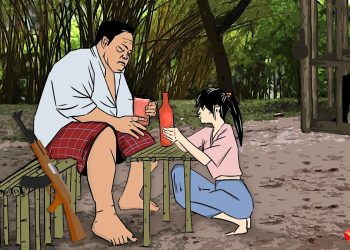Restoration Council of Shan State/Shan State Army-South (RCSS/SSA-S), one of the signatory ethnic armed groups of the nationwide ceasefire agreement (NCA), recently held separate meetings with State Counselor Daw Aung San Suu Kyi, Vice-Senior General Soe Win, deputy commander-in-chief of the Myanmar Army, and foreign diplomats in Myanmar.
The group has clashed with the Myanmar Army at least 20 times since it signed the NCA in October 2015. RCSS/SSA-S Chairman Gen Yawd Serk talked to The Irrawaddy about the meetings, peace process and the Rakhine crisis.
What did you discuss with the Chinese diplomats?
Overall, two things—we urged China to encourage Myanmar’s peace process, and encourage [armed ethnic] groups along the Myanmar-China border to sign the NCA. We also exchanged views on the problems facing Myanmar.
The third session of 21st Century Panglong Conference will be held soon. NCA non-signatories may be able to attend it, but would be barred from joining the decision-making process. What is the view of NCA signatories on this?
It is good if they can attend. But it depends on the government.
RCSS designated the areas of Homein and Mong Hta [in Southern Shan State] as its headquarters. It also signed the NCA with the government. What did the deputy commander-in-chief of the Myanmar Army discuss at the meeting?
We agreed to designate those areas as our headquarters in the Union-level peace talks. What the army understands is all the RCSS should be stationed there. But, according to our agreement at the Union-level peace talks, we’ll only deploy 60 troops there. We don’t have any agreement with the army about territories in state- or Union-level agreements or even in the NCA.
According to our understanding, the ceasefire is about stopping fighting. We should stop at the places where we are and stop exchanging fire. We’ve opened liaison offices in Taunggyi, Kholan, Kengtung, Tachilek, Muse, and Mong Pan to avoid misunderstandings, but the army barely makes contact with those liaison offices.
[Editor’s Note: SSA-S has about 8,000 troops active in a number of townships in eastern, southern and northern Shan State.]
There are concerns that the Rakhine crisis can hinder the peace process. What is RCSS’s view on it?
We know no more than was reported about the issue in the news. According to news reports, the crisis seems to be a big issue, but it appears not as serious as it sounds.
There were no serious armed clashes, and what we saw in the media is they were attacking with swords and sticks. We think it is just an inter-communal issue. Therefore, I don’t think it will impact upon peace. The country will get worse if the peace process is stalled. The Rakhine issue should also be resolved through dialogue; otherwise, the problem won’t end. It is important that we know the root cause of the problem, and address it. It is not a problem that needs to be settled with arms.
In Rakhine, some of the Muslim community self-identifies as Rohingya, but most Myanmar citizens reject that term and only recognize them as “Bengalis,” implying they are interlopers from Bangladesh. What is RCSS’s view on this?
We have limited access to news reports about the issue and barely know about the history. We have no idea about it, so no comment.
What do you say to allegations that RCSS is supporting Shanni Nationalities Army (SNA) to use it as a bargaining chip in the peace process?
We’ve nothing to do with it. We are [geographically] separated by the Irrawaddy River.
Translated from Burmese by Thet Ko Ko.
This interview has been edited for clarity and brevity.
















